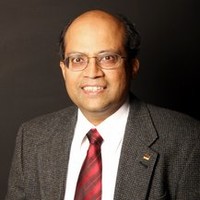
B Ramakrishna
- Courses5
- Reviews14
- School: Arizona State University
- Campus:
- Department: Materials Science
- Email address: Join to see
- Phone: Join to see
-
Location:
Arizona State University
Tempe, AZ - 85281 - Dates at Arizona State University: March 2009 - December 2015
- Office Hours: Join to see
Biography
Arizona State University - Materials Science
Resume
2012
Collaborate with other sustainability scholars from a spectrum of disciplines such as the natural and social sciences
medicine
engineering
mathematics
humanities and the arts to accelerate the pace of discovery in the field of sustainable energy by integrating practical experience with knowledge and action drawn from research and policy.
Arizona State University
Faculty in the Humanitarian Engineering Program
To inculcate in students a human systems engineering approach to identifying problem sets and solution sets to address the grand challenges for the developing world. I provide students a big picture of challenges and opportunities in Global Development and include content that is focused on various issues including
water/sanitation
energy
built environment
agriculture
health/hygiene
education and development practices. The students also engage in practical and meaningful design projects often set in rural and periurban contexts and include hands-on experience in humanitarian projects in the developing world.
Arizona State University
Diane and Gary Tooker Professor
Fulton Schools of Engineering
conduct research on biomaterials
teach engineering grand challenges
develop engineers who will be leaders that address the challenges in the 21st century
and serve the local and global communities in improving STEM education as well as leverage engineering for sustainable development. \n\nfaculty member in the Humanitarian EngineeringProgram at ASU
Arizona State University
The National Academies of Sciences
Engineering
and Medicine
Washington D.C. Metro Area
As Director of the Grand Challenges Scholars Program Network
I am responsible for broadening and deepening the impact of the National Academy of Engineering’s program across the US and around the world by forging vibrant partnerships between universities
industry
civil society and governments.\n\nThe Grand Challenges for Engineering is a cross disciplinary program whose goal is the “Continuation of life on the planet
making our world more sustainable
healthy
safe and joyful”. This effort has two components - “Initiative/R&D” and “Talent building” and I focus on the talent building aspects of the program to help create the workforce that will design solutions to the problems of the people and the planet.\n
Director
Grand Challenges Scholars Program Network at the National Academy of Engineering
As Director of this program recognized by the National Academy of Engineering
I was responsible for integration of research
education and outreach in areas such as
affordable energy
access to clean water
safe cyber space and increased access to health services
to prepare the global leaders to lead the knowledge economy of the 21st century.
Arizona State University
2011
IUCEE
Arizona State University
Washington DC
a) Assisting in the development of strategies
programs and relationships that support USAID's objectives in the energy sector as it relates to African agriculture
environment and economic growth b) Coordinate with a variety of US government interagency colleagues to provide intellectual leadership and technical guidance to support grid and off grid based power c) Develoing partnerships with higher education in the US and across Africa to deepen and broaden Power Africa's Impact
Senior Science and Technology Advisor
USAID -Power Africa Initiative
Organize workshops for faculty and administrators of engineering colleges in India on transforming engineering education to support the sustainable development of India.
IUCEE
2001
I presided over a board of 25 community leaders and raised $2.5M to bring about 4000 participants (K12 students
teachers
families and STEM professionals) from 44 countries to Arizona in 2005 to compete
judge and cooperate on STEM based solutions to our most challenging problems.
Founder and President of the 501c(3) organization
Intel International Science and Engineering Fair Arizona
Kannada
German
Tamil
Hindi
NATO Fellowship
To promote partnerships between academic institutions in Germany and the US for research
development and education
Jefferson Science Fellow
Jefferson Science Fellows serve for one year at the U.S. Department of State or USAID as science and technology advisors on foreign policy issues. The role of the Jefferson Science Fellows is both to advise and educate. They use their professional experience to increase the understanding among policy officials of complex
cutting edge scientific issues and their possible impacts on U.S. foreign policy and international relations. By bridging the science and policy worlds
they are able to advise policy makers on available policy options to address solutions for emerging international scientific issues. Following the fellowship year
the Jefferson Science Fellow will return to his/her academic career
but will remain available to the U.S. Department of State/USAID to serve as subject matter experts for a minimum of five years.
US Department of State
1994
Asha for Education is a secular organization dedicated to change in India by focusing on basic education in the belief that education is a critical requisite for socio-economic change. It was founded in 1991 and has over 1000 active volunteers across the US and around the world. So far about USD$25 million have been disbursed supporting over 400 project partners.\n\nhttp://www.ashanet.org
Co founder Arizona Chapter
Asha for Education
1978
Doctor of Philosophy (Ph.D.)
Materials Science
Indian Institute of Technology
Madras
1970
Master's degree
Chemistry
Indian Institute of Technology
Kanpur
1967
B.Sc (hons)
Chemistry
Bangalore University
Nexus of Energy
Engineering education and Entrepreneurship for Development
Energy Economics and Policy
Biomaterials
industry university partnerships for international development
Biosensors
Innovative Engineering Education
Renewable Energy
Science and Technology Policy
CVD
Integration of research
education and outreach
Engineering Diplomacy
Nanotechnology
Spectroscopy
Global Engagement of Universities
Science
Grand Challenges for Engineering
Materials Science
AFM
Sustainable Development
Nanomaterials
Ramakrishna
Bindiganavale
Ramakrishna
The National Academies of Sciences
Engineering
and Medicine
USAID -Power Africa Initiative




